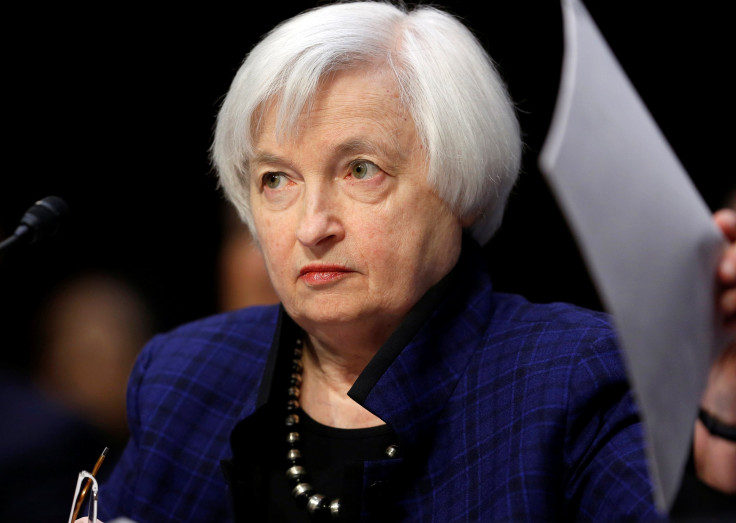Will The Fed Raise Interest Rates In 2017? Donald Trump Says He Wants To Expand The Economy

Janet Yellen sent expectations of a December hike in the interest rate sky high during her congressional testimony Thursday, with one futures marketplace pegging the probability at upwards of 90 percent. The upcoming move, which the Fed delayed at meetings in both September and November, could spell trouble for president-elect Donald Trump, who blasted the central bank as recently as two months ago.
“We are in a big, fat, ugly bubble, and we better be awfully careful, and we have a Fed that’s doing political things,” he said at the Sept. 26 debate at Hofstra University in New York. “This Janet Yellen of the Fed—the Fed is doing political—by keeping interest rates at this level. And believe me: The day Obama goes off, and he leaves, and goes out to the golf course for the rest of his life to play gold, when they raise interest rates, you’re going to see some very bad things happen, because the Fed is not doing their job. The Fed is being more political than Secretary Clinton.”
forget Yellen/Fed: Trump on @CNBC says Obama is keeping interest rates down, leaving it to "the new guy" in WH to raise them next January
— John Harwood (@JohnJHarwood) September 12, 2016
Although Trump economic advisor Judy Shelton promised Bloomberg Television’s David Gura last week that the Fed “will remain independent” under the president-elect, Trump has also accused the central bank of creating a “very false economy” by keeping interest rates low.
Regardless of the billionaire’s opinions of the Fed, the central bank is not beholden to the president of the United States. Yellen stated at her Thursday testimony that she planned to serve out the remainder of her four year term, which ends in January 2018.
While Trump’s comments may have few implications, if any, for the central bank, Yellen’s words — and, ultimately, the Fed’s monetary policy arm’s decision on interest rates after its meeting on Dec. 14 — have significant implications for the president-elect.
The Fed lowers the federal funds rate, or the interest rate at which banks loan to one another, to stimulate investment and borrowing in times of recession, and raises it to incentivize saving, effectively reining in the economy, in times of boom. In December 2015, the Fed raised its target for the federal funds rate for the first time since the Great Recession, from a range of between zero and 0.25 percent, a historic low, to its current range of 0.25 to 0.50 percent.
Now that U.S. markets have made significant progress in the recovery following the crisis of 2008, with the unemployment rate below 5 percent and monthly job growth averaging 181,000 so far in 2016, the economy is ripe for a tightening of monetary policy by the Fed. The central bank isn’t expected to stop at one rate hike in December, but rather is likely to begin a series of small interest rate increases, starting with the upcoming Federal Open Market Committee meeting. And that’s bad news for Trump.
As a candidate, Trump ran on promises to be “the best jobs president God ever created,” with gains of 25 million jobs in the next decade, and pledged to carry out a $1 trillion fiscal stimulus to help make that happen. These expansionary policies will be weakened by a higher federal funds rate. Yellen herself even noted that President Barack Obama’s previous stimulus, a response to the financial crisis eight years ago, had left “not a lot of fiscal space” for expansionary policy by the federal government, “should a shock to the economy occur, an adverse shock, that should require fiscal stimulus.”
In other words, not only will tighter monetary policy meant to tame the economy diminish Trump’s expansionary efforts, but the chair of the central bank has cautioned that the president-elect's efforts should be put on hold and saved for the possibility of another recession.
© Copyright IBTimes 2024. All rights reserved.












